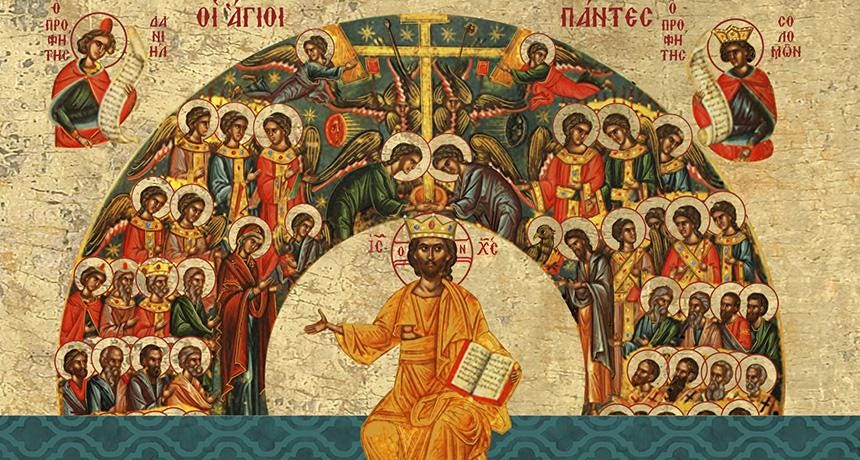Sunday of All Saints & Father’s Day
Hebrews 11:32–12:2a and Matthew 10:32-33, 37-38; 19:27-30
Today, we celebrate both the Sunday of All Saints and Father’s Day—and naturally, on such a day, we immediately reflect first on the example of our own biological fathers. Because God’s law is written on our heart, we can learn from our own fathers almost everything there is to know about fatherhood—because our dads were either a good example or a bad example of each of the different characteristics of saintly fatherhood. They teach us how to be, or not to be, good men.
St. Augustine says that all men are called to the vocation of spiritual fatherhood. Fatherhood is the vocational path by which men become saints. The saints are not distant icons; they are our family, our ancestors in the faith.
A Marine once wrote that 'Hard times create strong men. Strong men create good times. Good times create weak men. And, weak men create hard times.' St. Paul in Hebrews 11 names the great fathers of old: Gideon, David, Samuel—men who "through faith conquered kingdoms, administered justice... were made strong out of weakness" (Heb 11:33-34). Yet these were not merely heroes—they were fathers who passed down a living faith, not by living comfortably, but by embracing their duty.
The Lord says in today’s Gospel: “Whoever loves father or mother more than me is not worthy of me… and whoever does not take up his cross and follow me is not worthy of me” (Matt 10:37-38). This is not an anti-family message—it is a purification of fatherhood. To be a father in Christ is to put God first, and then to love one’s wife and children, even when it means suffering for them. St. John Chrysostom says: "He who does not carry his cross is not truly a disciple."
(Hom. on Matthew 35.2)
Every father is called to carry the cross daily—laying down his life for his family by providing for their spiritual and temporal needs and protecting them from spiritual and physical danger. We provide for the spiritual wellbeing of our children by ensuring they have regular access to the sacraments, through catechesis, reading the lives of the saints, and daily prayers together in the home. We protect our children from spiritual danger by keeping secular pop culture out of the home and our children’s daily lives, which includes complete oversight of their screen-time, friendships, and other influences.
The saints we honor today were not lone mystics—they lived in the communion of the Church—some as bishops or martyrs, all as spiritual fathers or mothers. Their holiness is a model of fatherly sacrifice. The saints are the pillars and foundations on which the Church is built. (Commentary on Matthew 10.23). Every Christian father is called to be a pillar for his family and the Church through steadfast sacrifice, fidelity, and prayer.
And so today, as we honor the cloud of witnesses and thank God for our earthly fathers, let us remember: holiness is not for the few. It is the universal call of baptism. It begins at home—at the dinner table, in our daily family prayers, in the battles we fight for purity, integrity, and fidelity.
Therefore, let us “run with endurance the race set before us, keeping our eyes fixed on Jesus” (Heb 12:1-2), and let us ask the saints to intercede for all fathers: that we may become reflective icons of the one Father “from whom all fatherhood in heaven and on earth is named” (Eph 3:15).
Glory be to the Father and to the Son and to the Holy, now and forever and ever. Amen.



